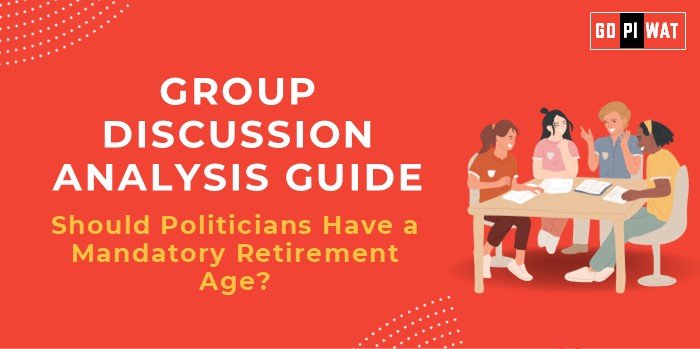📋 Group Discussion (GD) Analysis Guide
🌐 Topic: Should Politicians Have a Mandatory Retirement Age?
🌟 Introduction to the Topic
Opening Context: “The debate on whether politicians should have a mandatory retirement age is gaining relevance as leadership across the globe trends older, raising questions about inclusivity and representation.”
Topic Background: Historically, politics has been dominated by seasoned leaders. However, with the median age of national leaders at 62 years and global life expectancy increasing to 73.5 years, the issue of age-related governance efficiency and opportunities for younger leaders has gained prominence.
📊 Quick Facts and Key Statistics
- 🌍 Global Average Age of Politicians: The median age of national leaders worldwide is 62 years, reflecting a preference for experienced leadership.
- 🇺🇸 Elderly Representation in Politics: In the U.S., the average age of House members is 57.5 years, and Senators average 64 years, emphasizing the role of older leaders.
- 👥 Youth Representation Gap: In Latin America and the Caribbean, 48% of the voting-age population is aged 20–39, but only 27% are members of parliament—a 21% gap.
- 📈 Life Expectancy Increase: From 64.2 years in 1990 to 73.5 years in 2019, increased life expectancy has extended political careers globally.
🧑🤝🧑 Stakeholders and Their Roles
- 🏛️ Government Bodies: Establish governance frameworks and policies to balance representation across ages.
- 🧑🎓 Younger Citizens: Advocate for fair representation and inclusive leadership opportunities.
- 🧓 Elder Politicians: Defend the value of experience and stable leadership.
- 📚 Academics/Experts: Provide evidence on cognitive and decision-making trends across age groups.
- 🎭 Political Parties: Manage generational shifts while maintaining public trust.
🏆 Achievements and Challenges
🎉 Achievements:
- 👩⚖️ Experienced Leadership: Older leaders bring institutional knowledge and strategic foresight.
- 📜 Policy Continuity: Long tenures often ensure sustained policy implementation.
- 🌍 Global Examples: The longevity of politicians in countries like the U.S. demonstrates how seasoned leaders handle complex issues effectively.
⚠️ Challenges:
- 📉 Representation Gap: Youth are underrepresented in many regions, as seen in Latin America’s 21% disparity.
- 🧠 Cognitive Decline: Studies suggest a potential for decision-making inefficiencies in advanced age.
- 📊 Global Benchmarking: Countries with younger leadership, like Finland, often exhibit more progressive policies.
🗣️ Effective Discussion Approaches
📌 Opening Approaches:
- 📈 “With the median age of global leaders at 62, should politics embrace younger voices for broader representation?”
- ⚖️ “While life expectancy has extended political careers, it raises questions about generational inclusivity.”
- 📋 “Latin America’s youth representation gap of 21% highlights the challenges of balancing experience and inclusivity.”
🎭 Counter-Argument Handling:
- Use examples of elder statesmen’s achievements.
- Propose innovative mechanisms, such as mentorship, to balance experience with youth.
🔍 Strategic Analysis of Strengths & Weaknesses
- ✅ Strengths:
- Depth of experience.
- Policy consistency.
- ❌ Weaknesses:
- Risk of stagnation.
- Cognitive decline.
- 📈 Opportunities:
- Promoting inclusivity.
- Leveraging mentorship systems.
- ⚠️ Threats:
- Resistance to change.
- Potential disconnection from younger demographics.
📖 Structured Arguments for Discussion
- ✅ Supporting Stance: “A retirement age ensures fresh ideas and reflects demographic realities.”
- ❌ Opposing Stance: “Age-based limits undermine democratic choice and devalue experience.”
- ⚖️ Balanced Perspective: “While mandatory retirement may improve representation, alternative measures like term limits could achieve similar goals without age restrictions.”
🎓 Connecting with B-School Applications
- 📘 Real-World Applications:
- Analyze how leadership diversity impacts business strategies, team dynamics, and innovation.
- 📋 Sample Questions:
- “What parallels can be drawn between political and corporate leadership diversity?”
- “How does life expectancy influence career planning in governance and business?”
- 💡 Insights for Students:
- Leveraging multigenerational leadership.
- Understanding demographic impacts on policymaking and business strategy.


